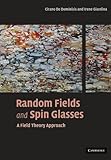Random fields and spin glasses : a field theory approach
Material type: TextPublication details: Cambridge, U.K.: Cambridge University Press, [c2010]Description: 213 pISBN: 9780521143554Subject(s): Physics and Astronomy | Condensed Matter PhysicsLOC classification: QA274.45
TextPublication details: Cambridge, U.K.: Cambridge University Press, [c2010]Description: 213 pISBN: 9780521143554Subject(s): Physics and Astronomy | Condensed Matter PhysicsLOC classification: QA274.45| Item type | Current library | Collection | Shelving location | Call number | Status | Notes | Date due | Barcode | Item holds |
|---|---|---|---|---|---|---|---|---|---|
 Book
Book
|
ICTS | Mathematic | Rack No 5 | QA274.45 (Browse shelf (Opens below)) | Available | Billno:96020; Billdate: 2016-12-07 | 00527 |
Browsing ICTS shelves, Shelving location: Rack No 5 Close shelf browser (Hides shelf browser)
1 - A brief introduction
2 - The Random Field Ising Model
3 - The dynamical approach
4 - The p = 2 spherical model
5 - Mean field spin glasses: one-step RSB
6 - The Sherrington–Kirkpatrick Model
7 - Mean field via TAP equations
8 - Spin glass above D = 6
9 - Propagators, mostly replicon
10 - Ward–Takahashi Identities and Goldstone modes
11 - Alternative approaches and conclusions
Disordered magnetic systems enjoy non-trivial properties which are different and richer than those observed in their pure, non-disordered counterparts. These properties dramatically affect the thermodynamic behaviour and require specific theoretical treatment. This book deals with the theory of magnetic systems in the presence of frozen disorder, in particular paradigmatic and well-known spin models such as the Random Field Ising Model and the Ising Spin Glass. This is a unified presentation using a field theory language which covers mean field theory, dynamics and perturbation expansion within the same theoretical framework. Particular emphasis is given to the connections between different approaches such as statics vs. dynamics, microscopic vs. phenomenological models. The book introduces some useful and little-known techniques in statistical mechanics and field theory. This book will be of great interest to graduate students and researchers in statistical physics and basic field theory. ---summary provided by publisher









There are no comments on this title.